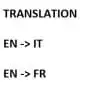
Translation English to French - approx. 6000 words - Native French speaker preferred
$100-500 USD
已取消
已发布超过 11 年前
$100-500 USD
货到付款
**A major international study choice website is looking to enrich its database with French translations of articles that are currently only available in English.**
We need a translation from English into French for 11 articles. Each article has on average approximately 550 words. The total amount of English words in the original texts is about 6000 words.
There is a sample translation included in the detailed description of this project. The quality of the translations must resemble at least the quality of the translation in the example.
Once a worker is selected we will send a word document with the original English texts in the left column of a table. The worker will enter the translations into in the right column of the table, next to the original texts. Once the translation is complete, the worker will send the word document including the original text and the translated text back to us.
Just to ensure that any applicant has read this entire description, please include the words "study in Europe" when applying to this project.
If this project is concluded satisfactorily and the translator is also fluent in Spanish, similar projects with translations to Spanish may follow.
## Deliverables
**Sample translation**
_**English original:**_
**Blended learning, e-learning and online learning: what's important?**
The evolution of technology has led to a confusing variety of terms in the field of distance education - distance learning, e-learning, online learning, virtual education, blended learning, flexible learning, etc. But what are these all about and what are key difference? Read below to overcome potential confusions.
Let's introduce some of these concepts:
* *Individual learning* can be defined as increasing one's capacity to take effective action *Learning* is moreover often a result of mediated experiences predetermined by the actual situation one is in, e.g. in a class room, at one's work space, etc.
* *Face-to-face or on-campus learning* is learning through a physical interaction between teacher and student at the same place and/or at the same time (i.e., in a class room / on-campus).
* *Distance learning* is learning diassociated from time and/or distance such that the learner does not share the same situation with what is being learned. It is a mode of study that allows the learner to study most or all of a course without attendance at a campus-based institution.
* *Online learning*: A term describing learning that takes place online and thus requires connection to the Internet.
* *E-Learning* refers to the appropriate use of ict to enhance the learning - and can thus take place on campus or in any other context.
* *Blended learning*: A mix of e-learning with traditional teaching and learning practices. Typically there is a combination of face-to-face interaction with online learning.
* *Mobile learning:* E-learning through mobile devices such as smartphones or tablets. More specifically, mobile learning activities can be designed to make use of a student's immediate context and surroundings, for example offering information about an artist while visiting an art gallery.
**Different terms many applications**
Most of these different concepts of learning refer to the use of technology and the location where the actual learning takes place (class-room / at a distance / online). Another important distinction is by the medium that actually supports the learning (ict, internet, books, etc.). Both, technology and medium may be used to overcome the barriers of your learning activities (=LINK), to combine study and work (=LINK), etc.
The interest in Distance Learning has not only grown due to available technology. Additionally, it has been strengthened as (recent) research did 'prove' that the use of computer assisted instruction and integrated learning systems technology significantly increases study results: Best results however were obtained in blended learning situations. That is why most distance learning institutions are using different (online and ict-mediated) media to deliver course materials (=LINK) and to stimulate interaction between students and teachers (=LINK). Most institutions use Virtual Learning Environment (VLE) or Learning Management Systems (LMS) (=LINK) for that purpose.
**Choosing the learning style that really suits you!**
Most important for your study success is to become aware about how you learn. Today we know that learning is situational. That means your learning outcomes strongly depend on the situations you learn in. Be aware of this when you choose your situations where and when you learn (=LINK). Even more important are the didactics and pedagogies of your learning activities as designed by the different learning institutions. E-learning can be used in a class-room or an online setting. Additionally, it can be used to simulate and intensify the authentic/work-based learning situations (=LINK). Pay attention to this: Sometimes online learning offers do not offer anything else than the same learning activities as used in a face-to-face / classroom situation. Other offers however make better use of the real potential of ICT by truly enhancing your learning experiences through innovative approaches.
**More dimensions of learning**
If you wish to understand further classifications of learning better - other important dimensions are: chronology (i.e., synchronous and a-synchronous interventention), the roles one has in education (e.g., multi-disciplinary groupings of learners), the focus / different aims, direction (instructor-directed versus learned-directed), personalisation, epistemology of education offered (e.g., active learning, cognitive constructivist, social constructivist, situative, associative, etc.), the openness of education (=LINK), etc.
Most important however, do not get confused with all the terms! Never forget: all these concepts have been developped to support you in your learning. So think about how you would like to learn and make use of tools like this website to find your perfect fit.
_**French translation:**_
**Apprentissage mixte, e-learning et apprentissage en ligne: ce qu'il est important de savoir**
L'?volution de la technologie a conduit ? une vari?t? d?routante de termes dans le domaine de l'enseignement ? distance - formation ? distance, l'e-learning, l'apprentissage en ligne, l'?ducation virtuelle, l'apprentissage mixte, l'apprentissage flexible, etc. Mais qu'en est-il vraiment et quels sont les ?l?ments cl?s de diff?rence? Apprenez-en plus ci-dessous pour ?viter toute confusion.
Nous allons explorer certains de ces concepts:
? *L'apprentissage individuel* peut ?tre d?fini comme une augmentation de la capacit? ? prendre des mesures efficaces. L'apprentissage est d'ailleurs souvent le r?sultat d'exp?riences de m?diation pr?d?termin?es par la situation r?elle, par exemple, dans une salle de classe, dans l'espace de travail, etc.
? *L'apprentissage en face-?-face ou sur le campus* est l'apprentissage par interaction physique entre l'enseignant et l'?l?ve ? un m?me endroit et / ou au m?me moment (par exemple, dans une salle de classe / sur le campus).
? *L'apprentissage ? distance* est le fait d'apprendre de fa?on dissoci?e en temps et / ou en distance, de sorte ? ce que celui qui apprend ne partage pas la m?me situation spatio-temporelle avec ce qui est en train d'?tre enseign?. Il s'agit d'un mode d'?tude qui permet ? celui qui apprend d'?tudier la plupart ou la totalit? d'un cours sans fr?quenter un ?tablissement sur le campus.
? *L'apprentissage en ligne*: Un terme d?crivant l'apprentissage qui se d?roule en ligne et n?cessite donc une connexion ? Internet.
? *E-Learning* se r?f?re ? l'utilisation appropri?e des TIC pour am?liorer l'apprentissage - et peut donc avoir lieu sur le campus ou dans tout autre contexte.
? L'apprentissage mixte: Un m?lange de e-learning avec l'enseignement traditionnel et les pratiques de l'apprentissage. G?n?ralement, il y a une association d'interaction en face-?-face et d'apprentissage en ligne.
? *L'apprentissage mobile*: il s'agit de l'e-learning sur des appareils mobiles tels que les smartphones ou les tablettes. Plus pr?cis?ment, des applications mobiles d'apprentissage peuvent ?tre con?ues pour utiliser l'environnement imm?diat de l'?l?ve et de ce qui l'entoure, en proposant par exemple des informations sur un artiste lors de la visite d'une galerie d'art.
**Diff?rents termes, de nombreuses utilisations**
La plupart de ces diff?rents concepts d'apprentissage se r?f?re ? l'utilisation de la technologie et de l'endroit o? l'apprentissage proprement dit a lieu (salle de classe / ? distance / en ligne). Une autre distinction importante se fait par le moyen d'aide ? l'apprentissage (TIC, Internet, livres, etc.). La technologie et les m?dias peuvent ?tre utilis?s pour surmonter les barri?res de votre activit? d'apprentissage (LINK =), pour combiner ?tudes et travail (= LIEN), etc.
L'int?r?t pour l'apprentissage ? distance n'a pas seulement augment? gr?ce aux technologies disponibles. En effet, il a ?t? renforc? comme le prouve une (r?cente) ?tude qui montre que l'utilisation de l'enseignement assist? par ordinateur et l'apprentissage int?gr? des syst?mes de technologie augmentent consid?rablement les r?sultats de l'apprentissage. De meilleurs r?sultats ont ?t? obtenus en revanche en situation d'apprentissage mixte. C'est pourquoi la plupart des ?tablissements d'enseignement ? distance utilisent diff?rents moyens (en ligne et TIC) pour livrer les supports de cours (= LIEN) et stimuler l'interaction entre les ?tudiants et les enseignants (LINK =). La plupart des institutions utilisent le Virtual Learning Environment (environnement d'apprentissage virtuel) (VLE) ou les Learning Management Systems (plate-formes de formation ? distance) (LMS) (= LIEN) ? cet effet.
**Choisir la m?thode d'apprentissage qui vous convient vraiment!**
Le plus important pour la r?ussite de vos ?tudes est de prendre conscience de la fa?on dont vous apprenez. Aujourd'hui, nous savons que l'apprentissage d?pend de votre situation. Cela signifie que vos r?sultats d'apprentissage d?pendent fortement des situations dans lesquelles vous apprenez. Soyez conscients de cela lorsque vous choisissez o? et quand vous voulez apprendre (LINK =). Plus importantes encore sont la didactique et la p?dagogie de vos activit?s d'apprentissage con?ues par les diff?rentes institutions d'apprentissage. L'e-learning peut ?tre utilis? dans une salle de classe ou en ligne. En outre, il peut ?tre utilis? pour simuler et intensifier les situations d'apprentissage pratiques / bas?es sur le travail (LINK =). Faites attention ? ceci: parfois les offres d'apprentissage en ligne ne proposent rien d'autre que les m?mes activit?s d'apprentissage utilis?es en face-?-face ou en classe. Toutefois, certaines offres font meilleur usage du potentiel r?el des TIC en am?liorant votre apprentissage ? travers des approches innovantes.
**Plus de dimensions de l'apprentissage**
Si vous souhaitez comprendre davantage les classifications d'apprentissage, les autres aspects importants sont: la chronologie (c'est-?-dire une intervention synchrone et asynchrone), les r?les d'une personne en mati?re d'?ducation (par exemple, groupements d'apprenants multidisciplinaires), la mise au point / les diff?rents buts , la direction (dirig? par un instructeur versus appris), la personnalisation, l'?pist?mologie de l'enseignement propos? (par exemple, apprentissage actif, constructivisme cognitif, constructivisme social, de situation, associatif, etc.), le degr? d'ouverture de l'?ducation (= LIEN), etc.
Cependant, le plus important est de ne pas ?tre d?sorient? par tous ces termes! N'oubliez pas: tous ces concepts ont ?t? d?velopp?s pour vous aider dans votre apprentissage. Alors pensez ? la fa?on dont vous souhaitez apprendre et utiliser les diff?rents outils comme ce site pour trouver ce qui vous convient le mieux.
项目 ID: 2778117
关于此项目
24提案
远程项目
活跃12 年前
想赚点钱吗?
在Freelancer上竞价的好处
设定您的预算和时间范围
为您的工作获得报酬
简要概述您的提案
免费注册和竞标工作
24威客以平均价$236 USD来参与此工作竞价

6.8
6.8

5.6
5.6

5.4
5.4

4.6
4.6

4.4
4.4

3.1
3.1

3.0
3.0

1.6
1.6

1.4
1.4

1.1
1.1

0.4
0.4

0.0
0.0

0.0
0.0

0.0
0.0

0.0
0.0

0.0
0.0

0.0
0.0

0.0
0.0

0.0
0.0

0.0
0.0
关于客户

Eindhoven, Netherlands
10
付款方式已验证
会员自7月 27, 2012起
客户认证
这个客户的其他工作
€8-30 EUR
€30-250 EUR
€1500-3000 EUR
€30-250 EUR
€30-250 EUR
类似的工作
$8-15 USD / hour
$8-15 USD / hour
$8-15 CAD / hour
$10-30 USD / hour
$30-250 USD
₹12500-37500 INR
$8-15 USD / hour
$10-30 USD
€8-30 EUR
$10-30 USD
$250-750 USD
$250-750 USD
€8-30 EUR
$750-1500 USD
$10-20 USD / hour
£250-750 GBP
₹1500-12500 INR
₹400-750 INR / hour
$149-150 USD
$2-8 USD / hour
谢谢!我们已通过电子邮件向您发送了索取免费积分的链接。
发送电子邮件时出现问题。请再试一次。
加载预览
授予地理位置权限。
您的登录会话已过期而且您已经登出,请再次登录。














